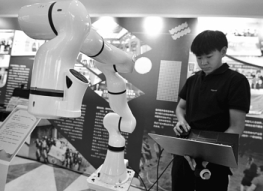INTERNET BUZZWORDS TRIGGER CONTROVERSY
Objections voiced after expressions go viral

The phrase tang ping, which translates as "lying flat", went viral on the internet in May, causing heated debate among people of different ages, in various fields of work and across many sectors of society.
The concept of "lying flat" embodies rejection of a life and work culture where there is constant competition.
However, many people object to such a concept, believing it means not having to work hard and struggle for a better life.
Others say the idea places emphasis on rejecting unduly fierce competition at school and work, and stresses that young people are looking for their own ways of career and life development.
The expression tang ping reportedly first appeared on the social media platform Douban, where people form groups according to their interests and share information about films, books, music and other subjects.
Mao Zhicheng, a doctoral student with a major in media studies, applied to the platform on June 30 last year to form a "lying flat" group, describing the concept as "a kind of philosophy".
"We are constantly facing changes. No matter how things change, (people in this group) will keep their hearts calm and prepare to be stricken by life itself," Mao stated in his application.
"We are looking into our hearts, getting used to being alone and choosing not to be controlled by desires, not to dance with the craziness in this world. We are already overloaded by information," he added.
"Lying flat" is seen as the opposite to "996"-working from 9 am to 9 pm for six consecutive days. Such a schedule is often experienced in the technology sector.
Mao, better known on the internet as Ben Shi, has received numerous applications to join the group since May, when it first featured in media reports.
"Many people condensed their lives into just a few lines in their applications," he said.
"Some applicants said they have health problems as a result of working a '996' schedule for years. Other feel exhausted, but have to go on fighting for their families, some stay idle at home after losing their jobs, and some who reach middle age feel they are being pushed out because they are old."
Mao believes the group helps people. "Many members share their experiences and receive a warm response. Although everyone hides their identity on the internet, they are very sincere when they talk about their stories and feelings," he said.
He added that there is no need to be overly concerned about people "lying flat".
"No one can lie flat forever-it's just a temporary rest. After all, we all have our responsibilities," he added.
Appealing idea
Mao said he founded the group on the internet after noticing that such a subculture existed. Before the words "lying flat" appeared, phrases such as fo xi, which means "as calm as a Buddha" and refers to people with a low level of ambition, had cropped up on social media.
"I think 'lying flat' is a sub-sector in social psychology. It may not even influence people's actual behavior, as they still need to work and study hard to have a good life," he said.
"But the idea inevitably has its appeal. People are always tense and they need to vent their feelings."
"Lying flat" has caused controversy, with many people fearing the younger generation has lost the appetite to work hard for a better life.
Li Zongheng, 26, a technology data analyst, said "lying flat" is widely seen by young people as being contrary to nei juan, another internet term that means "unduly fierce competition".
"The words 'lying flat' should be seen from two sides. On the one hand, it is important to aspire and to struggle, but on the other, it may not be good to blindly follow others in unreasonably fierce competition, which could damage one's psychological and physical health," he said.
Cui Chaoxia, 25, who works for an animation production company, said no one she knows is "lying flat".
"Too many young people who follow '996' working schedules shop hard and spend all their monthly salary at the same time. Many of us are adopting another way of thinking," she said.
"We want to control our desire to consume, to enjoy life in a simpler way. We want to learn to live a more balanced life, to take better care of our health, and to spend more time with family, not just to work hard."
Wang Fen, 33, a financial worker at the Chinese Academy of Sciences, said: "When we use the expression 'lying flat', we don't mean we are not working. We simply don't like vicious competition. We work as hard as we can, but we are also looking at life in a more balanced way."
Chen Rui, associate professor of communication psychology at Communication University of China, said the appearance of buzzwords such as "lying flat" deserves further research, but there is no need for society to be unduly concerned about them.
"Many people may think the expression 'lying flat' is interesting. It should not be taken literally to mean young people are 'lying flat' and not doing any work," he said.
"The students I know now, and recent graduates, are keen to discuss such buzzwords, but they are working and studying hard. They do not actually lie flat," he added.
Chen said people should not overly rely on the internet when they want to learn about trends in society.
"According to a report by the China Internet Network Information Center, less than 10 percent of internet users have a bachelor's degree or higher qualification. We cannot say that netizens represent the younger generation, or that they represent the majority of the population," he said.
Cause of concern
One of the latest expressions to cause concern is fo xi, or Buddha-like, which some young people use to describe themselves, as they care little about wealth, material life, or personal achievements.
While many people think the popularity of such words reflects a lack of motivation among the younger generation, Chen believes they are an "expression of feelings", which is a good thing for society.
"Emotions are easily exaggerated when they are expressed on the internet, and subtle feelings in society are often expressed in an exaggerated way. It is good that young people are willing to vent their feelings in cyberspace," he said.
Other popular expressions have appeared in recent years. Young people often say they are tu, or bald. Chen said this does not mean they are bald, but that they face so much pressure their hair is falling out. "It is self-mockery," he said.
Another expression is jin li, or colorful carp, which is a sign of good luck on the internet, as young people like to send colorful carp emojis to wish one another good fortune.
Chen said forwarding such emojis does not mean young people are becoming superstitious, adding that such expressions demand further study, as they convey feelings in society.
Cui, who started work with the animation company after leaving her job with a training institution that was reducing headcount, said: "I have always wanted a job in the animation industry, although there is a lot of overtime in this business and the pay is not that good. I want to give it a try and find the industry that best suits me."
Geng Peisen, 20, a junior student at Northeast Forestry University in Harbin, capital of Heilongjiang province, said he is also looking for an industry in which he can build his career after graduation.
"I want to find an internship and then a job, and to no longer depend on my parents' support after I graduate. I have not met anyone who actually lies flat. After all, it's too early in life for college students to do this," he said.
Those who worry about "lying flat" often compare it with otaku, a Japanese word that refers to people who become engrossed in hobbies, particularly anime and manga.
The former is a style of film and television animation, while manga refers to comic books and graphic novels, typically aimed at adults as well as children.
Most otaku are millennials who become obsessed with a particular aspect of popular culture to the detriment of their social skills.
As a result, the term has also become synonymous with the word "homebody", used to describe someone who prefers to stay at home for long periods and refuses to go out.
Chen, the social psychology researcher, believes that "lying flat" is different from otaku, and that the latter is not as harmful to society as many people think.
"The emergence of Japanese otaku culture has a specific historical and social cultural background. This culture raises its head when young people in Japan re-examine their needs and desires," he said.
"While there is otaku in Japan, we should also observe that Japan is still among the best in the world in scientific and technological development, and that the development of society has not been hampered by this subculture.
"Similarly, 'lying flat' will not become a mainstream factor of society, and its existence indicates progress. People now have more diversified pursuits, they listen to their hearts more, and society has become more tolerant while adhering to mainstream values."
Cheng Minsheng, professor at Henan University's College of History and Culture in Luoyang, Henan province, said the popularity of the expression "lying flat" means young people need more encouragement and better guidance, which should be given in a way that interests them.
Cui said: "Many people have been giving young people advice that sometimes makes us angry, including that we should not care about payment at work. There is a lot of pressure in life and we need more constructive advice."
Chen said people should tolerate various views in society, including the subcultures of young people.






Today's Top News
- Shared Journey: Chinese new energy vehicles in Europe: competition or co-creation?
- Deep sea needs down-to-earth scientific research
- Deeper opening-up promised for steady growth
- China to rebalance growth with domestic demand boost
- Consultative suggestions provide policymakers with essential inputs to finalize five-year plan
- Decoding China: How the people run the country






























